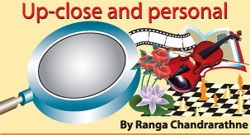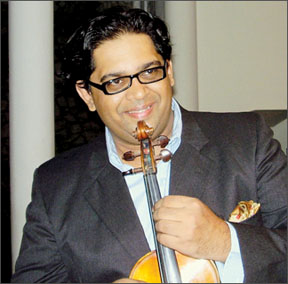'Music maketh a man'
Lakshman Joseph de Saram :
 Lakshman Joseph de Saram, generally regarded as Sri Lanka's foremost
violinist, is also creating a name for himself in the film industry.
Best known for his ground breaking music for Boodee Keerthisena's film
Mille Soya, the score went on to win the countries most prestigious
awards and the international SIGNIS award for that year. Lakshman Joseph de Saram, generally regarded as Sri Lanka's foremost
violinist, is also creating a name for himself in the film industry.
Best known for his ground breaking music for Boodee Keerthisena's film
Mille Soya, the score went on to win the countries most prestigious
awards and the international SIGNIS award for that year.
Currently signed up to write the music for three major
internationally produced films, he has also been chosen by Sri Lanka
Tourism along with six other major artistes to represent the country at
this years UNESCO concert in Paris in September, showcasing the 'Best of
Sri Lanka'.
 RC: We are here to talk about the newly formed Chamber Music
Society of Colombo, but first, how did your involvement in Sri Lankan
music come about after your stint in New York City? RC: We are here to talk about the newly formed Chamber Music
Society of Colombo, but first, how did your involvement in Sri Lankan
music come about after your stint in New York City?
LJDES: It all started when my brother called and said that President Premadasa wanted to start a professional orchestra in Colombo, and if I
would like to lead it. I must say, the 5 or 6 years the orchestra
lasted, were incandescent.
The music making was at a very visceral level. Rohan truly had a rare
gift of passion that he was able to transmit to both the musician and
the audience. And his incredible charisma obliterated the many
fundamental flaws the orchestra had.
There were valuable lessons learnt too, the kind of intensity the
orchestra generated was not readily understood and accepted by the
typical Colombo concert goer, as was the programming. Plus we performed
way too many concerts to be financially viable over the long term. It
was too much too soon. But it was an exhilarating experience while it
lasted. RC: Did you get into composing film music in that period?
LJDES: Well, in 1991, I met Boodee Keerthisena in the East Village in
Manhattan while he was studying there.
I suppose that was the seed of our many collaborations. Almost 12
years later at a mutual friends roof top party, he asked me very
casually to try writing some music for his film Mille Soya. I
reluctantly accepted the challenge and was constantly second guessing my
every move. I was fortunate though, to have in Boodee a director who was
very flexible and spontaneous in the studio, and he knew how to pace it.
Plus my apprenticeship with Maestro Khemadasa for 9 odd years helped
greatly too. It made it that much less impossible a task.
RC: Anyway, the critics loved what you did and showed their
appreciation by awarding you two significant citations.
LJDES: The film has soul and won all the important awards that year,
I was quite flattered and immensely encouraged.
RC: As a purely classically trained musician, how are you able to
deal with the different demands that writing film music requires, and
especially, Sri Lankan film music?
LJDES: Firstly, I think it is possible with a sound classical
technique and understanding, be it eastern or western, to be able to
slide into other forms of music making.
The playing or writing of big band, crunk, anything really, other
than perhaps pure folk, is not too difficult to get into if you have an
ironclad classical background. As for my understanding of Sri Lanka's
sounds, it is an on going learning experience enhanced considerably by
my very close artistic association with Maestro Khemadasa. He is a
constant inspiration and the bedrock that serious modern music of Sri
Lanka is built on. Like it or not.
RC: You have also worked with the internationally acclaimed Sri
Lankan director Prasanna Vithanage, tell us something about his
particular style of film making.
LJDES: Ira Madiyama was the film I did; it has been brilliantly
reviewed and awarded all over the world, as is most everything that
Prasanna does. Working with him is easy because he knows exactly what he
does not want, so it's a question of elimination, not this, not that,
till we ultimately come up with what the visual needs.
RC: Any personnel ideas on how one can improve the effectiveness of
Sri Lankan film music?
LJDES: I have ideas on how to improve my approach to writing film
music. That is about it really.
RC: Now tell us about this new Chamber Music Society you have
founded.
LJDES: Well, I have been asked to do this for the last 15 odd years,
and that is to get involved in some way with the tiny so called western
music sub-culture of the country. A sub-culture that by circumstance, I
happened to be born into.
RC: How much credibility and relevance is there in this sub-culture
you say you belong to?
LJDES: (Laughing) Nasty question! But you hit a word I am very
interested in, and that is relevance. There is no relevance in the big
picture when we perform Mozart here, other than it being fleeting
entertainment to a few people in the rarefied environment of a concert
hall, there is no lasting value to the countries cultural well being.
That is why the primary tenet of the Society is all about Sri Lanka.
It's about the music created by Sri Lankan composers, and by others,
using Sri Lanka as a reference point.
Of course, being the beneficiaries of 500 years of crippling atrophy
of the fine arts, we pretty much have to start from scratch; we don't
have a great body of serious music to perform, so our concerts will
feature music of other lands. Something we are immensely grateful for,
but the main focus will be a work of original content that has cultural
significance to the country we live in. It is not going to be an after
thought.
RC: This sounds very exciting and timely. Why has it taken you 15
years?
LJDES: I really don't know the answer; I suppose it has been a
blending of disenchantment and apathy. And I think the only credible way
forward to me at least, without compromising the composer's intentions,
was to produce something of value to the audience, is to take the
chamber music route.
We have the right number of excellent musicians for that. I always
like saying this, but it's very much like a chef and a recipe. If the
recipe calls for 10 eggs and you got one, forget it. Look at something
else. I would rather not cook, than dish out something mystifying. I
think the audience deserves better.
There are a few ensembles in Colombo that have the same agenda, and
their concerts are an immense breath of fresh air. Anyway, to get back
to the Society, things just clicked this year. I felt compelled, driven
if you will. And it is looking good.
We have some wonderfully dedicated musicians who are all like-minded;
the rehearsals are time well spent.
And we enjoy tremendous moral support from the most eminent cultural
icons of the country, to further encourage our efforts, we were given
the singular honour of performing our inaugural concert at "Temple
Trees" for President Rajapaksa, where he felicitated Dr. Khemadasa.
That concert was received very favourably. We intend to further prune
our sound before making it available to the general public, this is done
by our on-going pre-view concert program for carefully invited
audiences, it's almost like a tasting room for new wines.
We take very seriously the feed-back the audience gives us on all
aspects of the experience. It's a slow evolving process of
experimentation and distillation. We are in no hurry.
RC: Let us look at classical music again if you will, how do you
perceive classical music and its audiences in Sri Lanka?
LJDES: Having some experience in the biz over the last 30 odd years,
and having been involved in many forms of broad basing music across the
country. I have sadly realized that although our population and access
to information have greatly increased, the classically minded audience,
both eastern and western has not kept pace. You can say that it has
actually declined over the last 15 years or so.
This trend seems strangely inevitable and not just a Sri Lankan
phenomenon, it is being felt all over the world, other than perhaps
Venezuela, where they have the best school based classical music program
by far, and the dividends are astonishing.
RC: You are probably one of the best people in this country to answer
this question; do you think there can be ways of reversing this trend in
Sri Lanka?
LJDES: I do not think I am in anyway qualified to answer that monster
of a question, but on a superficial level, I have come to believe, that
any meaningful association with high culture is the sad but true
preserve of a tiny minority.
It has been that way forever really. And I don't think it has
anything to do with cultural elitism or finances. It has been shown that
no matter how persistent you may be on broadcasting classical music
across to the masses, you are not going to see a quantum leap of the
number of people clamouring for Bruckner's late symphonies or the Raga
shree.
The music is most likely falling on deaf years. The only silver
lining in dishing out great music liberally is that there could be a few
people out there who may find some bewildering solace in what they have
just heard, and would like to know more about that particular piece of
music and so on. That is where my advocating a designated classical
radio channel comes in.
Radio is probably the easiest and cheapest way of getting it across.
It has to be freely and constantly available. But then again, we are a
country that looks like it's perfecting the art of self destruction, and
I would think, have more important priorities.
RC: What are you currently professionally involved in?
LJDES: It's all about music. Sadly, I do not enjoy the refuge of a
day job!
RC: Is there anyone you would care to talk about, who has had a
pivotal roll in your musical life?
LJDES: Celibidache. 24 years ago, a defining now point of blinding
clarity that I feel to this very day. That is how I am able to feebly
describe my debt to him.
RC: Thank you.
LJDES: Thank you.
[email protected] |
